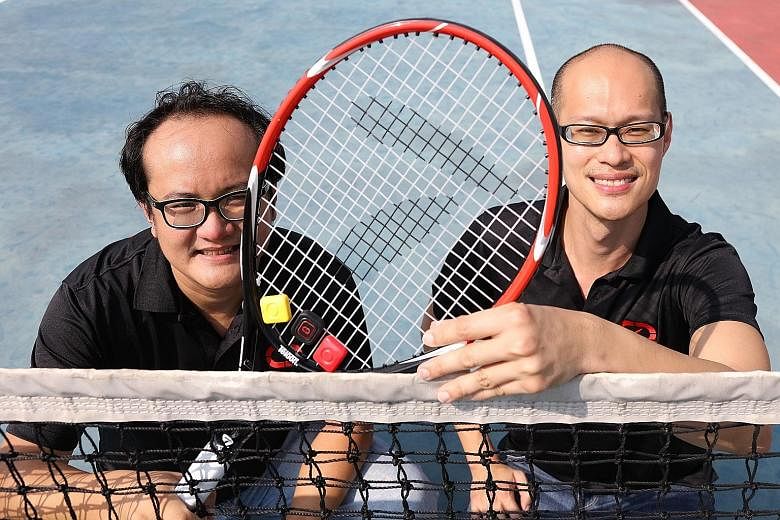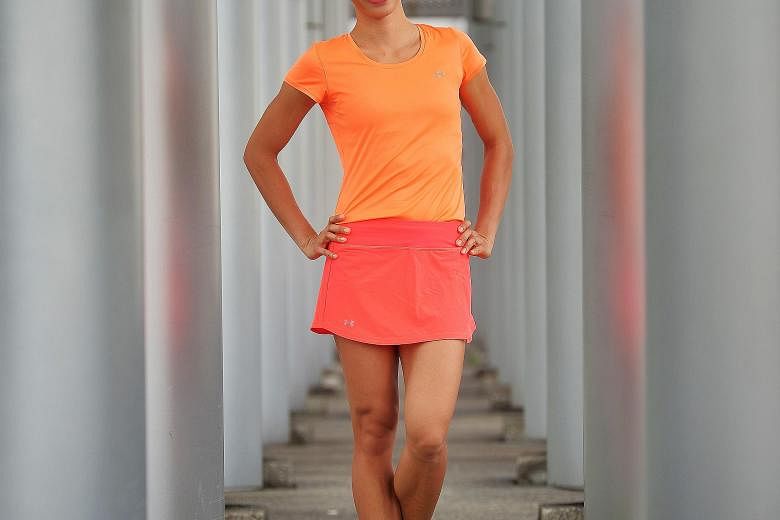Singapore start-up 9 Degrees Freedom has launched tennis performance sensor Qlipp via an online crowdfunding campaign.
Weighing just 8g, this Bluetooth device is clipped on a tennis racquet like a dampener.
It detects and records a player's stroke type, swing speed, ball spin and other statistics, and transmits the data in real time to the Qlipp app, which is available on both Android and iOS.
The crowdfunding campaign at Indiegogo (http://igg.me/at/qlipp) started two weeks ago with a funding target of US$30,000 (S$40,000) and will end on Aug 3 at 2.59pm.
Qlipp is expected to go on sale in December at US$129, but backers of the campaign can get it for as low as US$79.
The tennis sensor is a result of three years of research by 9 Degrees Freedom's founders Cen Lee, 36, and Donny Soh, 37.
Mr Soh was working on a tennis virtual reality programme for A*Star when he decided to port it to the real thing.
"We were collecting data, such as strokes and haptic feedback, for the virtual reality programme. And I thought why not use the data to improve the game of real players instead?" he said.
He got Mr Lee on board, as both were on the same wavelength.
They observed that tennis seemed to be gaining good traction but the sport had few of the sensor devices that golfers could use to track their swing.
"Tennis has a higher dollar value per player," Mr Soh noted.
They have been gathering playing data from more than 50 players, including tennis coaches and junior and national players here.
Said Mr Lee: "Our investors are saying it is interesting that two guys who don't really play tennis end up being on tennis courts all the time."
Babolat Play Pure Drive smart racquet and Zepp Tennis are among the tennis sensors in the market, but Qlipp's co-founders think theirs is superior.
"The Qlipp can be installed on any tennis racquet. And players' feedback is that having the sensor on the handle (as in the case of Babolat and Zepp) hinders the way they play," Mr Lee said.
Mr Lee said players can use the app to video their strokes and view them against the data gathered to improve their game.
There will also be a social network aspect to the app in future.
National player Sarah Pang, who was involved in Qlipp's development, said: "Tennis is actually a game of statistics, but it often goes unaccounted for.
"Qlipp connects this gap by helping players track their on-court progress with specific measurables," she added.
Mr Marc Koh, manager of Singapore Tennis Association's full- time tennis programme, thinks "the device is a must-have for any serious tennis player who seeks to improve his or her game".
Having raised around $250,000 in funding from A*Star, Media Development Authority of Singapore, NTUitive and individual investors over the years, the start-up is now looking to launch the product as well as raise more funds via the Indiegogo crowdfunding website.
"We are using Indiegogo more to collect pre-orders and test the market as well," Mr Lee said.



